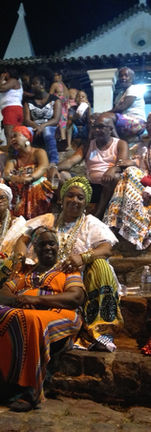
Cachoeira
African Diaspora in Brazil
Irmandade da Boa Morte
Every August, the town of Cachoeira swells in size for an
almost week-long celebration held by a group of elderly Brazilian women who are the
descendents of enslaved people from Africa. They are called the Irmandade da Boa Morte,
and their organization has continued for hundreds of years. The festival, and the organization
itself, on the outset might look very Catholic--the "Good Death" of their name refers to the death
of Mary--but the reality is much more complex. Within this group, the women also were able to continue their own African religious traditions through Candomblé as well as strategize for the freedom of enslaved people. They raised money to buy some people's freedom and to fund funerals and burial places for Black people, who were not allowed in the European cemeteries (Davies 576-577). Their work was an example of the ingenuity and creativity that Black women had throughout slavery to continue their culture and fight for their people. The popularity of their annual celebration demonstrates how powerful this legacy still is. Denize Ribeiro, a professor of Health and Nutrition at the Federal University in Sao Felix who also helped to start the Coletivo Angela Davis shared in an article for Vice, "These women are the continuation of the first Black feminists in Brazil. The Sisterhood is part of a historical strategy of resistance against slavery and against racism. (Ngangura)" In a part of Brazil that has been fundamentally shaped by the history of slavery, the Irmandade da Boa Morte are a critical reminder of the many ways that people have worked and continue to work towards freedom.
Works Cited
Davies, Carole Boyce. Encyclopedia of the African Diaspora: Origins, Experiences, and Culture. Vol. 2, ABC-CLIO, 2008. pp. 576–578.
Ngangura, Tarisai. “Intimate Portraits of a 200-Year-Old Sisterhood That Honors the Dead.” Broadly, VICE, 6 Sept. 2018, broadly.vice.com/en_us/article/ywk75w/boa-morte-festival-sisterhood-images.










